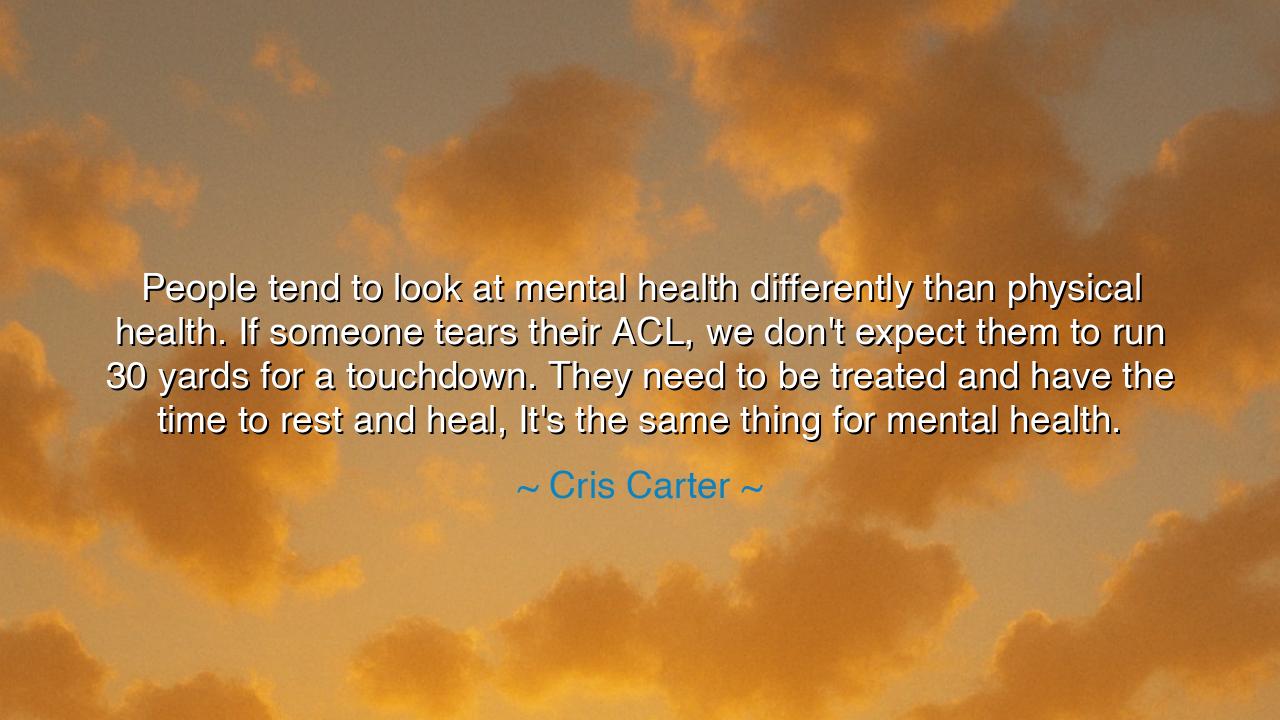
People tend to look at mental health differently than physical
People tend to look at mental health differently than physical health. If someone tears their ACL, we don't expect them to run 30 yards for a touchdown. They need to be treated and have the time to rest and heal, It's the same thing for mental health.






“People tend to look at mental health differently than physical health. If someone tears their ACL, we don't expect them to run 30 yards for a touchdown. They need to be treated and have the time to rest and heal. It’s the same thing for mental health.” – Cris Carter
In these heartfelt words, Cris Carter, the legendary football player turned mentor, speaks not as an athlete, but as a wise elder who has seen both triumph and struggle. His message pierces through the illusions of strength that society so often worships — that to suffer in silence is noble, and to admit pain is weakness. He reminds us that mental health, like physical health, is an inseparable part of our humanity. Just as a torn ligament demands rest and healing, so too does a wounded mind. In his words, there is both compassion and correction: a call to treat the unseen injuries of the soul with the same care and patience we give to the visible wounds of the body.
Carter’s analogy — the torn ACL — is drawn from the world he knows best, the field of sport, where the body is pushed to its limits and injury is part of the journey. When a player falls to the turf, clutching their knee, the crowd goes silent, the medics rush in, and the team unites in concern. No one demands that the player rise immediately and finish the game. The injury is respected, and healing is given priority. Yet, when the wound lies within — when a person suffers anxiety, depression, grief, or trauma — society too often looks away, urging them to “shake it off” or “get back in the game.” In this contrast, Carter exposes a truth that spans the ages: humanity has long feared what it cannot see, and thus, it neglects the inner pain that cries for rest.
From the ancient healers of Greece to the philosophers of the East, the wise have taught that the mind and body are one — that neither can thrive without the other. The great physician Hippocrates once said, “It is far more important to know what person the disease has than what disease the person has.” Even he understood that illness is not only of flesh, but of spirit. Carter’s words echo this timeless understanding. He reminds us that mental health is health, no less real, no less vital. To dismiss emotional pain is to deny a part of our humanity, and to deny humanity is to invite suffering that multiplies in silence.
Consider the story of Abraham Lincoln, a leader revered for his strength and wisdom. Yet beneath his steady voice and stoic face, he battled what he called “the black dog” — the deep melancholy that haunted him through war and loss. Lincoln, like so many heroes of history, carried unseen wounds. His greatness did not come from denying them, but from enduring them with honesty and courage. In Lincoln, as in Carter’s words, we find a lesson for all generations: that strength is not the absence of suffering, but the willingness to seek healing.
Carter’s wisdom carries also a warning — that to ignore the mind’s injuries is to invite ruin. A torn ACL left untreated grows worse; the body compensates, falters, and breaks further. So it is with the spirit. When anxiety, depression, or trauma are dismissed, they do not vanish; they deepen, spreading through a person’s life like cracks through stone. The ancients would have called this imbalance — a disharmony between the heart, body, and mind. True health, they taught, lies in balance, and balance cannot exist without care for the whole being.
But Carter’s words are not only for those who suffer; they are also a call to those who witness. Just as a team supports its injured player, so must society support those who struggle within. Compassion is the medicine of the soul. When we listen, when we offer time, when we say, “Rest, and heal,” we become healers ourselves. The act of acknowledging another’s pain is the beginning of their recovery. It is how communities grow strong — not by demanding constant performance, but by giving space for restoration.
Therefore, children of the future, learn this truth and keep it in your hearts: the mind deserves the same mercy as the body. When you feel weary, do not be ashamed to rest. When you see another falter, do not urge them forward — walk beside them, and help them heal. Speak of your pain as freely as you would of a broken bone, for silence feeds the wound, and honesty opens the door to recovery. Seek help not as weakness, but as wisdom — the wisdom to honor the life that breathes within you.
And let Cris Carter’s words endure as a sacred reminder: the game of life cannot be won by endurance alone. Victory belongs to those who understand that healing is not surrender, but strength; that rest is not retreat, but renewal. For when the mind is tended as the body, when compassion replaces judgment, then — and only then — shall the human spirit rise whole and unbroken, ready to walk again in the light of health and hope.






AAdministratorAdministrator
Welcome, honored guests. Please leave a comment, we will respond soon